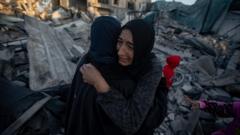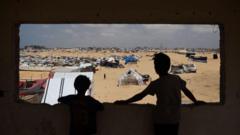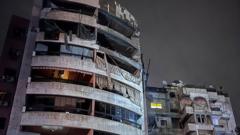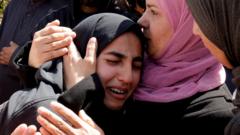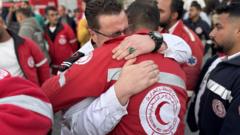The Israeli military has issued an evacuation order for Rafah, citing increased military operations against Hamas. The UN warns of humanitarian violations as food and medical supplies dwindle for displaced residents.
Urgent Evacuation Ordered in Rafah Amid Intensified Conflict in Gaza
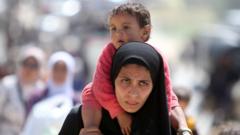
Urgent Evacuation Ordered in Rafah Amid Intensified Conflict in Gaza
Israel's military has mandated a large-scale evacuation of Rafah as violence escalates, igniting a humanitarian crisis in the territory.
The Israeli military has issued a sweeping evacuation order for the city of Rafah in the southern Gaza Strip, marking the largest mobilization since intensified operations commenced earlier this month. Residents of Rafah and the nearby area of Khan Younis have been instructed to evacuate immediately towards the designated al-Mawasi humanitarian zone, as military operations aim to dismantle the capacities of terrorist organizations in the region.
Many displaced Palestinians who had recently returned to Rafah during a two-month ceasefire have begun fleeing once again, with roughly 20% of Gaza currently under evacuation directives. The UN human rights office expressed concern last week, indicating that these evacuations do not conform to international law, criticizing Israel for inadequacies in providing shelter and adequate living conditions for those forced to leave their homes.
The Israeli government claims these evacuations are necessary for civilian protection against Hamas, which it accuses of utilizing civilians as human shields in breach of international norms. The military has assured that efforts are being made to mitigate civilian casualties. Following a resurgence of air and ground assaults against Hamas on March 18, Israel cites the group's refusal to accept a new ceasefire proposal from the US—alongside the ongoing hostage situation—as justifications for its actions.
Since this recommencement of hostilities, more than 1,000 individuals have lost their lives in Gaza according to reports from Hamas-aligned health authorities. The UN has highlighted critical shortages of food and medical resources for the 2.1 million residents, further exacerbated by Israel's blockade of humanitarian aid since early March.
Rafah, bordering Egypt, has seen significant destruction in previous operations, with many civilians returning during the recent ceasefire. Despite Israel's assertion of maintaining a buffer zone to deter arms smuggling and Hamas for rearming, conditions remain dire.
The plight of displaced residents like Haifa Duhair illustrates the human cost of the ongoing conflict, as she described fleeing with her infant and three other young children, forced to navigate the chaos on foot due to a lack of transportation.
Continued air strikes across Gaza led to further civilian casualties, with reports of multiple fatalities in various neighborhoods, including fatalities during an Israeli attack in Gaza City. As military operations focus on expanding security perimeters, the Israeli forces claim to dismantle significant Hamas infrastructure, including underground tunnels, while emphasizing an aggressive stance against armed groups following the unprecedented attacks on October 7, 2023.
According to Gaza's health ministry, over 50,350 lives have been lost since the renewed escalation of violence, deepening the urgency for humanitarian intervention and dialogue among involved parties.




